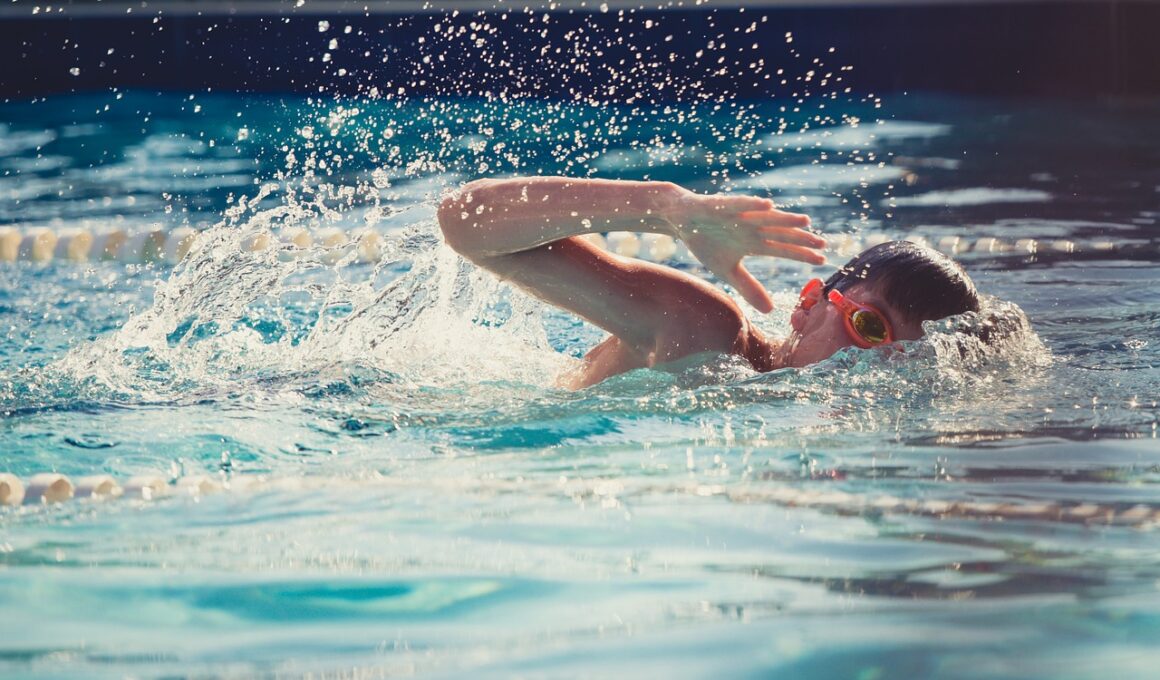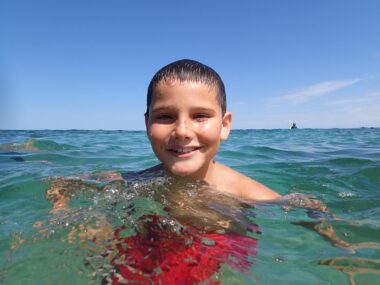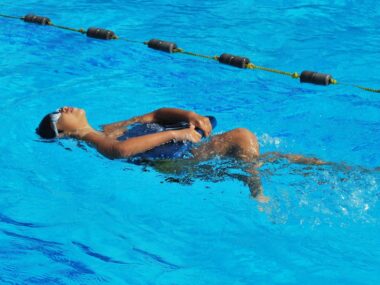The Science Behind Swimming and Child Development
Swimming as an activity is not just an enjoyable pastime for children; it also plays a significant role in their overall development. Engaging in swimming helps kids improve their physical coordination, balance, and strength. As children learn to swim, they utilize nearly all muscle groups, which encourages muscle growth and enhances body control. Swimming also aids in the development of cardiovascular endurance, critical for maintaining a healthy lifestyle. It can be beneficial for both children with high energy levels and those who may be more reserved. Furthermore, swimming encourages ear and lung function development. While gliding through water, children learn to control their breathing, which can facilitate better respiratory health as they grow. Alongside these physical benefits, the skill of swimming aids in fostering self-confidence among children as they conquer the fear of water. Overall, learning to swim offers multifaceted advantages that can help children throughout their lives. Early introduction to swimming guarantees a continual progression of essential life skills that extend beyond the pool, enhancing a child’s adaptability and resilience in various experiences they may face.
Moreover, social skills significantly benefit from swimming lessons. During swim classes, children often work as a team, fostering friendships and cooperation among peers. Such group dynamics enhance social interactions which are vital during child development. Engaging with others in a water environment leads to the development of loyalty, trust, and teamwork. Children learn to cheer for one another, encourage each other, and navigate challenges together, thus forging strong bonds. Furthermore, swim instructors play a crucial role in creating an environment that fosters peer relationships. When children connect with others, they learn valuable social cues that are essential in everyday situations. Alongside personal interactions, participating in swimming competitions can also introduce children to healthy competition. This aspect encourages respect for others, sportsmanship, and resilience, helping children cope with winning and losing gracefully. Swimming also can build a sense of community when participating in local swim meet events. Additionally, swimming has a calming effect that can mitigate anxiety and stress, providing children with better emotional regulation throughout their daily interactions with others and reducing feelings of social isolation.
Enhancing Cognitive Abilities
In addition to the physical and social benefits, swimming contributes significantly to cognitive development. The concentration required while swimming enhances focus and attention spans, beneficial for academic success. As children traverse through the challenges of learning new strokes or techniques, their problem-solving skills improve significantly. They learn to analyze their surroundings, adjust their strategies accordingly, and think critically about how to approach different swimming conditions. Additionally, the rhythmic nature of swimming can help in improving memory retention. The brain is engaged in coordinating movements while simultaneously managing breathing patterns. This mental activity not only enhances cognitive processing but also offers a unique avenue for stress relief, allowing children to unwind and recharge. Studies suggest that physical exercise, such as swimming, can stimulate the production of hormones associated with improved mood and cognitive functions. This beneficial hormone release assists in combating feelings of fatigue and boosts overall mental health. Through swimming, children obtain an enriched mental environment that can help them excel academically and socially, reflecting the profound interconnectedness of physical activity and cognitive improvements.
Another important aspect of swimming for kids is its contribution to emotional growth. Navigating fears related to swimming—like deep water—teaches children important lessons about resilience and perseverance. Each child’s journey may differ, and this experience can bolster a never-give-up attitude crucial throughout life. Learning to swim offers a structured environment where children can express and manage their emotions, such as excitement upon mastering a new skill or frustration during challenging lessons. This experience provides opportunities for emotional expression and self-regulation. Moreover, swimming often serves as a form of therapy for children experiencing anxiety or stress. The tranquil environment of water coupled with the physical movement can promote relaxation and mindfulness. Additionally, swimming provides an excellent escape from distractions, helping children focus inward. This aspect of swimming can significantly enhance emotional resilience, teaching them to handle daily stresses more effectively. In summary, swimming fosters an emotional landscape essential for coping with life’s ups and downs while engaging in a fulfilling, healthy activity. Overall, this holistic approach to child development ensures every child emerges stronger with meaningful life skills.
Physical Health and Safety Awareness
Swimming is a critical skill that also plays a vital role in health and safety. The ability to swim can mean the difference between life and death, particularly in aquatic settings. Swimming lessons teach children not only how to swim but also how to observe and react to potentially dangerous situations in water. This awareness can prevent accidents and equip children with knowledge regarding water safety practices. Moreover, knowledge about swimming safety can significantly reduce anxiety about being in or around water as they mature. Instilling these practices at a young age can lead to a lifelong respect and understanding of water hazards. Additionally, swimming helps combat childhood obesity, a pressing health concern in today’s society. Engaging in swimming as a form of enjoyable exercise helps maintain healthy weight levels and reduces the risk of various diseases associated with inactivity. Furthermore, swimming offers an excellent cardiovascular workout that builds endurance, strength, and flexibility. Regular swimming can improve overall physical fitness, fostering a balanced healthy lifestyle. Overall, swimming offers significant health benefits while enhancing awareness of the importance of safety around water.
Encouraging children to adopt swimming as a routine sport builds lifelong healthy habits. Structured swimming programs not only introduce children to the sport but also instill values like discipline and commitment. As children witness improvements in their swimming skills over time, they build self-discipline, which extends to other life areas, including academics. The time commitment necessary to excel at swimming nurtures an understanding of time management and the significance of setting personal goals. Swim practices require children to balance their academic responsibilities alongside their training schedules. This balancing act evolves into an inherent skill that fosters resilience and perseverance, proving to be valuable in adulthood. The physical stamina developed through regular swimming increases a child’s capacity to participate in various sports and activities. Therefore, perhaps most importantly, children learn that the effort put into swimming directly correlates with their achievements. Through this recognition, they understand that success involves commitment and hard work, lessons that remain impactful throughout their academic, professional, and personal lives. By fostering these attributes, swimming significantly contributes to mold a child’s character, ultimately enriching their future.
The Lifelong Impact of Swimming
In conclusion, swimming for kids is about more than just mastering a sport; it promotes comprehensive development covering physical, cognitive, emotional, and social domains. Through engaging in swimming, children become more adaptable and resilient, preparing them for various challenges ahead. This multifaceted growth emphasizes the crucial role of swimming in not only developing a skill but also shaping character traits necessary for future success. By starting swim lessons early, parents ensure their children receive these essential benefits. The combination of physical fitness, safety awareness, and emotional resilience demonstrates swimming’s transformative impact on children’s lives. As they grow, children who swim maintain valuable skills that carry over to other aspects of life, including sports, education, and relationships. Furthermore, instilling a love for water-based activities encourages lifelong fitness and wellness, leading to healthier lifestyles. Ultimately, the science behind swimming and child development is truly profound, highlighting the inseparable connection between aquatic activities and child growth. Parents, educators, and communities must recognize the importance of swimming education and encourage participation to foster a future generation that values health, safety, and well-being.
In essence, swimming provides a holistic platform where children can grow into well-rounded individuals equipped with valuable life skills. Engaging with peers, exploring emotions, and experiencing triumph over adversity through swimming creates opportunities for self-discovery. The social interactions enhance communication and friendship-building, contributing positively to their interpersonal skills. Thus, swimming should be viewed not just as an extracurricular activity, but as a foundational aspect of child development rooted deeply in science and empirical benefits. Encouraging kids to swim offers a unique opportunity to foster essential skills and attributes that propel them forward. Raising awareness about these benefits can help cultivate a culture where swimming is a valued and encouraged life skill. As parents, encouraging participation in swimming should be prioritized to allow children to thrive both in and outside the water. Overall, swimming significantly influences child development by extending beyond the physical. By nurturing a multifaceted approach that intertwines swimming into everyday life, we ensure a future generation equipped with the tools necessary for success in life’s many facets.





